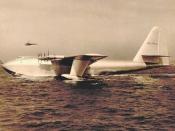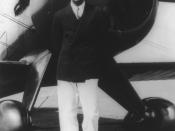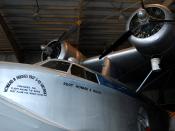In the early 20th century, the business side of the world halfway went unnoticed. World War I had just ended, and the depression was kicking in full speed. American's weren't spending; they were just saving their money until the depression evaporated. However, one man during this time became widely known for his movie making and money spending. Howard Hughes had a niche for pleasing the country. He never stopped at creating something better for America.
I would call Howard Hughes a poster child for this era. The movie, The Aviator, had its ups and downs. Both the movie and the real life Howard Hughes demonstrated a capitalistic approach. Capitalism is an economic system in which the means of production and distribution are privately or corporately owned and development is proportionate to the accumulation and reinvestment of profits gained in a free market. Howard Hughes was capitalism. His passion for movies and airplanes took effect tremendously during the 20s.
To much surprise during this time, Howard Hughes made it all happen. Aside from his movie making industry, his infatuation with airlines created havoc with competition. Panam was a big time airline industry at this time as well. And until Howard Hughes came along, they were the only airline. Hughes was a risk-taker, there's no doubt about that. His entrepreneurship cost millions of dollars from the government, and it was shocking how he could pull it off during a time like the depression. He loved the money making and the fame that came with it all, though.
Today, capitalism is everywhere. But during those early years, it was phenomenal to see capitalism boom to such great heights. How were American's supposed to afford to fly? Howard Hughes didn't care. His mind was set on making the fastest, and biggest airplane that could...


